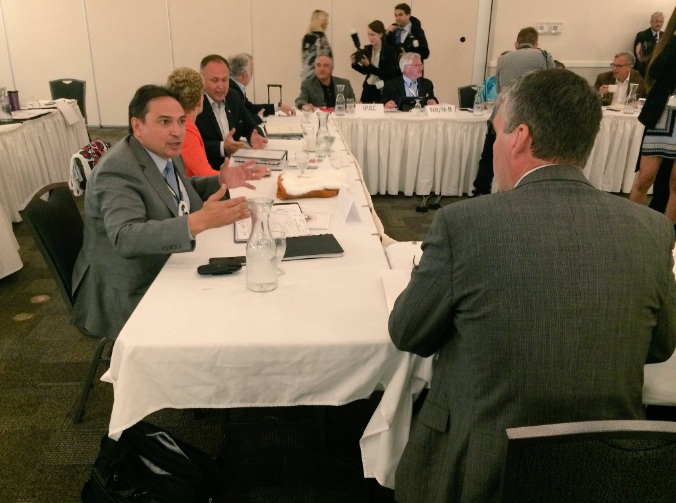
WHITEHORSE—Aboriginal leaders and provincial premiers say there’s no need to wait for an inquiry into missing and murdered aboriginal women to get to work on the issues behind the problem.
“Governments don’t have to wait for the outcome of the inquiry,” said National Chief Perry Bellegarde of the Assembly of First Nations after a meeting with Canada’s premiers and territorial leaders Wednesday in Yukon.
“Governments can make investments to end violence amongst our people, amongst indigenous women and girls, and to deal with investments in housing and education and training and daycare and shelter and detox centres and wellness centres.”
The federal government is expected to release details about the inquiry shortly.
The premiers are in Whitehorse for their annual summer meeting. They met with aboriginal leaders before two days of discussions about other issues, expected to include freer trade across jurisdictional boundaries.
Yukon Premier Darrell Pasloski agreed improvements could be begin right away.
“The federal government, the provinces, the territories, and the indigenous governments and leaders need to continue to act now, that we don’t wait for the results of the inquiry before we begin to move forward. That was acknowledged by everybody in the room.”
Earlier in the day, provincial and territorial premiers said there is strong support for the inquiry.
Alberta Premier Rachel Notley said individual provinces have specific concerns, but there’s significant consensus among her colleagues.
Quebec’s Philippe Couillard said his province wants to ensure allegations of police sexual abuse of aboriginal women in his province are included. It would be better to have one inquiry rather than two parallel investigations, he said.
The premiers and aboriginal leaders also discussed how to develop natural resources and their associated infrastructure, including pipelines, with the consent and participation of First Nations.
“To governments—federal, provincial, municipal, and into industry—the message is simple: before you build anything, build a respectful relationship with indigenous people,” said Bellegarde.
Pasloski acknowledged the leaders didn’t talk about specific ways aboriginals could be included in the design or assessment of resource projects. But he emphasized their buy-in will be crucial to future developments.
“When any business or industry wants to engage in and work in an area, they need to engage the local First Nations right off the bat. It will be a challenge for those projects to be successful unless they have that engagement.”
Pasloski said earlier that the premiers hope to work out an agreement that would allow provinces and territories to do business with each other in the same way Canada trades with other countries with which it has free-trade deals.
“It’s ridiculous you can’t buy B.C. wine in Ontario when you can buy it almost anywhere else around the world,” said British Columbia Premier Christy Clark.
Clark said the interprovincial deal is close, but only after intense negotiations.
B.C., Alberta and Saskatchewan signed their own free-trade alliance, the New West Partnership, in April 2010.
Speaking in Gatineau, Que., Trudeau cited recent negotiations on the Canada Pension Plan as a sign that provinces can work together. Wynne and Clark expressed confidence a new Canada Pension Plan deal will be ratified, but probably not at the Whitehorse meetings.
The premiers are also expected to discuss health care, climate change and pension reform. One proposition that is almost guaranteed will be a call for more health-care funding.
“I know there will be a conversation at the table of what the expectations are across the country,” said Ontario Premier Kathleen Wynne.
Premier Dwight Ball of Newfoundland and Labrador said his cash-strapped province faces a spike in medical costs as the population ages.